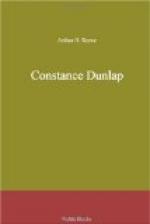“I think he is in Bridgeport,” she replied as casually as she could. “Your ship, you know, sails to-night. He has sent word to me to give orders that all the goods here at the Junta be ready to cart over by truck to Brooklyn. There has been no change. The papers are to be signed during the day and she is to be scheduled to sail late in the afternoon with the tide. Only, as you know, some pretext must delay you. You will hold her at the pier for us. He trusts all that to you as a master hand at framing such excuses that seem plausible.”
Gordon leaned over closer to her. He was positively revolting to her in the role of admirer. But she must not offend him—yet.
“And my answer!” he asked.
There was something about him that made Constance almost draw away involuntarily.
“To-night—at the pier,” she murmured forcing a smile.
Shortly after dark the teams started their lumbering way across the city and the bridge. Messengers, stationed on the way, were to report the safe progress of the trucks to Brooklyn.
Constance slipped away from the boardinghouse, down through the deserted streets to the waterfront, leaving word at home that any message was to be sent by a trusty boy to the pier.
It was a foggy and misty night on the water, an ideal night for the gun-runner. She was relieved to learn that there had been not a hitch so far. Still, she reasoned, that was natural. Drummond, even if he had not been outwitted, would scarcely have spoiled the game until the last moment.
On the Arroyo every one was chafing. Below decks, the engineer and his assistants were seeing that the machinery was in perfect order. Men in the streets were posted to give Gordon warning of any danger.
In the river a tug was watching for a possible police boat. On the wharf the only footfalls were those of Gordon himself and an assistant from the Junta. It was dreary waiting, and Constance drew her coat more closely around her, as she shivered in the night wind and tried to brace herself against the unexpected.
At last the welcome muffled rumble of heavily laden carts disturbed the midnight silence of the street leading to the river.
At once a score of men sprang from the hold of the ship, as if by magic. One by one the cases were loaded. The men were working feverishly by the light of battle lanterns—big lamps with reflectors so placed as to throw the light exactly where it was needed and nowhere else. They were taking aboard the Arroyo dozens of coffin-like wooden cases, and bags and boxes, smaller and even heavier. Silently and swiftly they toiled.
It was risky work, too, at night and in the tense haste. There was a muttered exclamation—a heavy case had dropped! a man had gone down with a broken leg.
It was a common thing with the gun-runners. The crew of the Arroyo had expected it. The victim of such an accident could not be sent to a hospital ashore. He was carried, as gently as the rough hands could carry anything, to one side, where he lay silently waiting for the ship’s surgeon who had been engaged for just such an emergency. Constance bent over and made the poor fellow as comfortable as she could. There was never a whimper from him, but he looked his gratitude.




